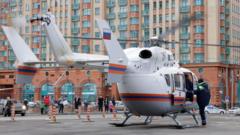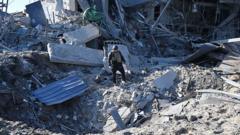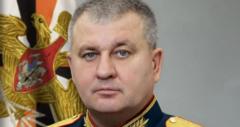Armen Sargsyan, head of the "Arbat" battalion, succumbed to injuries from a blast at a residential building as authorities investigate potential orchestrators of the attack.
Pro-Russia Paramilitary Leader Dies After Moscow Blast

Pro-Russia Paramilitary Leader Dies After Moscow Blast
A pro-Russian paramilitary leader has died following an explosion in Moscow, raising questions about security and escalating tensions in Ukraine.
Armen Sargsyan, the head of the "Arbat" battalion, a pro-Russian paramilitary group involved in the eastern Ukraine conflict, died after succumbing to injuries sustained from an explosion in northwest Moscow on Monday. The blast occurred in the entrance hall of a residential building and left him severely wounded, leading to his emergency evacuation by helicopter to a nearby hospital. Despite intensive care efforts, Sargsyan could not be saved.
The incident reportedly also injured two others, including one of Sargsyan's bodyguards, and there are unconfirmed reports of another casualty. Russian media outlets, which often receive information via Telegram channels, have linked Sargsyan to past criminal activities, indicating he was previously identified by Ukraine's security service, the SBU, as a suspect in multiple serious crimes and was on an international wanted list. Specifically, he was accused of recruiting prisoners to fight in Ukraine.
In the aftermath of the explosion, witnesses reported a scene of disarray, with debris scattered across the heavily damaged entrance of the building. Local resident Olga Voronova expressed her fears due to the explosion, pointing out the security measures typically in place at the building.
Sargsyan's background reveals he hailed from Horlivka, a city in Ukraine's Donetsk region, which has been under Russian control following the annexation in 2014. He was also the head of the Boxing Federation in the self-proclaimed Donetsk People's Republic. Current investigations suggest that the attack was deliberate, with officials indicating it is being treated as a planned assassination attempt, while investigators work to identify those responsible for ordering the crime.
The attack underscores an ongoing pattern of violence directed towards high-ranking figures aligned with Russia’s intervention in Ukraine. Notable instances include the assassinations of other military officials and supporters within occupied territories and Moscow itself.
As Ukraine continues to navigate its complex security environment, the implications of Sargsyan's death are likely to resonate across both military and civil sectors involved in the ongoing conflict.
The incident reportedly also injured two others, including one of Sargsyan's bodyguards, and there are unconfirmed reports of another casualty. Russian media outlets, which often receive information via Telegram channels, have linked Sargsyan to past criminal activities, indicating he was previously identified by Ukraine's security service, the SBU, as a suspect in multiple serious crimes and was on an international wanted list. Specifically, he was accused of recruiting prisoners to fight in Ukraine.
In the aftermath of the explosion, witnesses reported a scene of disarray, with debris scattered across the heavily damaged entrance of the building. Local resident Olga Voronova expressed her fears due to the explosion, pointing out the security measures typically in place at the building.
Sargsyan's background reveals he hailed from Horlivka, a city in Ukraine's Donetsk region, which has been under Russian control following the annexation in 2014. He was also the head of the Boxing Federation in the self-proclaimed Donetsk People's Republic. Current investigations suggest that the attack was deliberate, with officials indicating it is being treated as a planned assassination attempt, while investigators work to identify those responsible for ordering the crime.
The attack underscores an ongoing pattern of violence directed towards high-ranking figures aligned with Russia’s intervention in Ukraine. Notable instances include the assassinations of other military officials and supporters within occupied territories and Moscow itself.
As Ukraine continues to navigate its complex security environment, the implications of Sargsyan's death are likely to resonate across both military and civil sectors involved in the ongoing conflict.




















